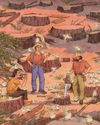Try GOLD - Free
Spinoza & Other Determinists
Philosophy Now
|December 2023 / January 2024
Myint Zan compares different ways of denying free will.

The following sentences appear in a letter written by the great Dutch philosopher Baruch Spinoza (16321677):
“Further conceive, I beg, that a stone while continuing in motion should be capable of thinking and knowing, that is endeavouring, as far as it can, to continue to move. Such a stone, being conscious merely of his own endeavour and not at all indifferent, would believe itself to be completely free, and it would think that it continued in motion solely because of its own wish. This is that human freedom, which all boast that they possess, and which consists solely in the fact, that men are conscious of their own desire, but are ignorant of the causes whereby that desire has been determined”
(Letter to G.H. Schaller, October 1674).
These three sentences in Spinoza’s letter determine (pun intended) that he was a philosophical determinist. Without distorting Spinoza’s message, we could rephrase it this way: “If a stone in motion were to have human-level consciousness, then the stone, like some humans, including philosophers, would think that it is moving out of its own volition and free will, although it isn’t.”
If one fast-forwards from the late seventeenth century to the late twentieth century, in a lecture in March 1990 the astrophysicist Stephen Hawking also expressed an opinion about free will (see Chapter 13: ‘Is Everything Determined?’ in his 1993 book
This story is from the December 2023 / January 2024 edition of Philosophy Now.
Subscribe to Magzter GOLD to access thousands of curated premium stories, and 10,000+ magazines and newspapers.
Already a subscriber? Sign In
MORE STORIES FROM Philosophy Now

Philosophy Now
Books
Lucy Weir takes a wheel of healing for an intellectual spin, Frederik Kaufman examines a theory of the origins of equality, and Frank S. Robinson doubts a holistic vision of life, the universe, and everything.
14 mins
October/November 2025

Philosophy Now
Moral Decision-Making for a Job Search
Norman Schultz wonders when working is wrong.
14 mins
October/November 2025

Philosophy Now
The Mediation of Touch
A conversation between Emma Jones and Luce Irigaray.
15 mins
October/November 2025

Philosophy Now
Edward Gibbon (1737-1794)
John P. Irish considers some principles of history through the history of a historian.
11 mins
October/November 2025

Philosophy Now
Karl Sigmund
is an emeritus professor of mathematics at the University of Vienna. He has made major contributions to evolutionary game theory and to the history of the Vienna Circle, who met regularly in Vienna from 1924-1936. Katharine Mullen talks with him about mathematics, and about the Vienna Circle.
5 mins
October/November 2025

Philosophy Now
Can Al Teach Our Grandmothers To Suck Eggs?
Louis Tempany wonders whether the problem is with the machines or with us.
7 mins
October/November 2025

Philosophy Now
Revisiting the Ontological Argument
Raymond Tallis contends that a definition of God cannot necessitate God's existence.
7 mins
October/November 2025

Philosophy Now
What My Sister Taught Me About Humanity
Lee Clarke argues that we need a more inclusive view of moral personhood.
13 mins
October/November 2025
Philosophy Now
Macmurray on Relationship
Jeanne Warren presents aspects of John Macmurray's philosophy of the personal.
4 mins
October/November 2025

Philosophy Now
Forced Vaccination
Naina Krishnamurthy asks if it's ethical or egregious.
8 mins
October/November 2025
Translate
Change font size

